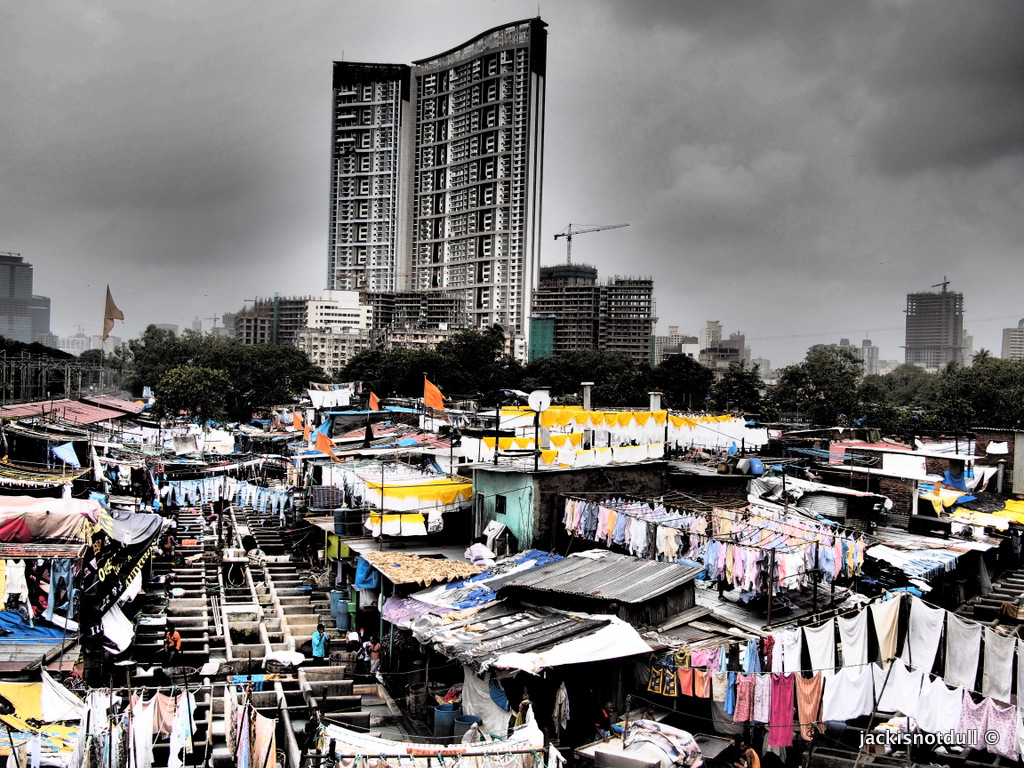It’s 8am and already the heat of Mumbai (Bombay) is penetrating. It has all the markings of a scorching day. But the Dhobi Ghats have been working since dawn. Here in the Halakshimi area is one of India’s innovative industries, the world’s biggest open-air laundry.
“It’s an inherited profession,”my guide Sancia tells me as I look in astonishment at the hundreds of men below. “Often there’s so much work that they have to hire extra labor.”The Dhobi Ghats are confined to this laundry-community from an early age, but these days, they’re trying to educate their children so they can have a better occupation.
Looking down from the bridge on the street, I see numerous stalls, some filled with clear water, others with blue liquid. Bare chested men in lungis (sarongs) are standing knee deep in water, soaping, washing or rinsing garments. “They spend all these hours from morning to sunset in water. Many are addicted to an ancient kind of opium called Bangui, which apparently helps them stay in that water all day,”Sancia informs me in a matter of fact way.
Clients are from all over this huge city and with a population of over 10 million, one can only assume that the amount is staggering. No one has any good idea of how many pieces are washed, ironed and folded in one day
When each garment is new, it is immediately coded with a small mark. It denotes the district and the street of the customers and only the Dhobis can de-code the marking. After sorting out the orders, the cleaned laundry is unbelievably delivered to the correct address. What’s so amazing it that most of the old Dhobi Ghats are illiterate and yet with their various markings, they manage to get the orders to the correct owners.
From my vantage point, it seems like a strange miniature play happening below. I suggest to Sancia that I would like to get closer. She seems mystified by my request. However, after some inquiries, I’m told that I could go into the wash area.
Down a constricted concrete staircase through a long narrow lane filled with old cars and garbage, I walk through a very narrow doorway to a very wet space. I’m now standing in water. A tout tries to collect money from me, assuming I would believe he actually works there. “He’s not a Dhobi Ghat but it’s his way of earning a living,”I’m told. I give him some coins.
I’m anxious to get closer to the activity. It’s a frenetic workplace. Slaps and splashes of water confront me as over 650 Dhobi Ghats are getting into their daily workload. ”Buttons are really the only thing that suffer,”says Sancia, who has had the same Dhobi Ghat for 10 years. “It’s the bashing of the garment against the concrete as they wash that destroys the buttons. But interestingly, the fabrics don’t seem to suffer too much.”
Just behind me are a couple of men carrying, on their backs, ready for washing bundles. They rush toward the cubicles not deterred by my presence.
As I get closer, I see that the clean water comes from a hand pump in the individual stalls. The garments are then rubbed with soap in a small sink. Other stalls are filled with blue colored bleach where the white garments are dipped. After a thorough rinse, the clothes are taken to the rear of the huge area where there are hand wringers working on equipment reminiscent of the very early washing machines wringers.
After the laundry has been wrung out, it is hung on every available surface including rooftops, makeshift clothes-lines and pavement. In a somewhat drier section, the ironers are pressing the freshly washed and dried garments.
“Sometimes, but rarely, it does happen that they make an error when they deliver the finished items. But they’re able to rectify it so quickly,”Sanica says. “My Dhobi collects and returns the laundry once a week. And they don’t just wash clothes. I send my sheets and curtains also.”The price for these services, when I translate it into dollars, seems excruciatingly low, about 20 cents a piece.
I look at one of the finished shirts. The starching and folding is so perfect, the garment looks brand new. I know I’ll never be able to pick up my laundry without thinking of these men in the tiny cubicles under the hot sun, fulfilling a job for hundreds, if not thousands of clients, each day.

